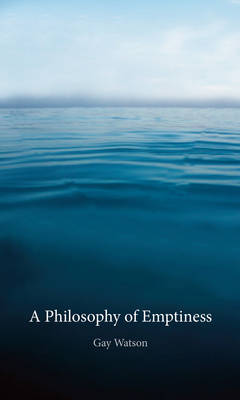
A Philosophy of Emptiness

Listening to a performance of John Cage's 4'33", you hear, at first, nothing. Yet on listening more closely, something is heard: the coughs of the audience, the shuffling of paper, gentle muttering. What had seemed to be emptiness is instead something more significant, a meditation on the sounds present even within silence. In A Philosophy of Emptiness, Gay Watson reclaims emptiness as a positive, empowering state, an antidote to the obsession with substance and foundation.
Watson offers an alternative view of emptiness. Via a tour of early and non-Western philosophy, she uncovers its rich history, taking us from Buddhism, Taoism and religious mysticism to the contemporary world of philosophy, science and art practice. As Watson argues, the twentieth century has seen the resurgence of emptiness and offers reasons why such an unappealing concept has attracted modern musicians, artists and scientists, as well as pre-eminent thinkers throughout the ages.
A Philosophy of Emptiness probes the idea of how a life without transcendence might be lived, and why one might choose it. It links these concepts to current ideas of meditation and the mind, and offers a rich and intriguing take on the idea of emptiness that will appeal to all those with an interest in the history of thought.
Click here to read the paper:
'Around a Philosophy of Emptiness' »
Click below to read the Reaktion Books blog article (March 2014):
Why are the Concepts of ‘Nothing’ and ‘Emptiness’ so Current at this Time?
Click here to listen to Gay's Philosophy of Emptiness podcast on the Middle Way Society website »
“Emptiness” is a term that puzzles, appeals and infuriates in equal measure. Gay Watson’s marvelous book provides the first in-depth study of the concept of emptiness as it is used in contexts as diverse as ancient Buddhist philosophy and the practice of contemporary art. Her essay is a penetrating inquiry into the liberating and challenging implications of an idea whose time may now be upon us.
Stephen Batchelor, author of Confession of a Buddhist Atheist.
Ironically, Gay Watson's book on emptiness is wonderfully full. It's overflowing with clarity, insight, dry humor, and sheer verve in its explorations of reality and our consciousness of it. It's rare to find a book so saturated with scholarhip to be also so encouraging and helpful for those whose interest in impermanence and interdependence is more than academic. This wide-ranging examination of existence and experience is both contemporary and likely to become a classic.
Rick Hanson, Ph.D., author of Buddha's Brain: The Practical Neuroscience of Happiness, Love, and Wisdom
From John Cage to Samuel Beckett, creators have pondered the issue of sound and silence: in this book Gay Watson makes us think profoundly about that challenge of action and inaction, in the arts and in life. It is a most stimulating reflection on the pressures of our time, which will give everyone pause for thought.
Nicholas Kenyon, Managing Director, Barbican Centre
"Gay Watson's insightful and fascinating dive into emptiness, stimulates on every page. In a contemporary culture obsessed with inter connectedness, sharing and collaborative thought A Philosophy of Emptiness reminds us of the need for some kind of singular stillness. As we leave space(s) for our individual attention to be refocussed; invention, clarity and creativity seeps in. A new world of becoming and possibility ensues."
Wayne McGregor, Resident Choreographer, Royal Ballet.
